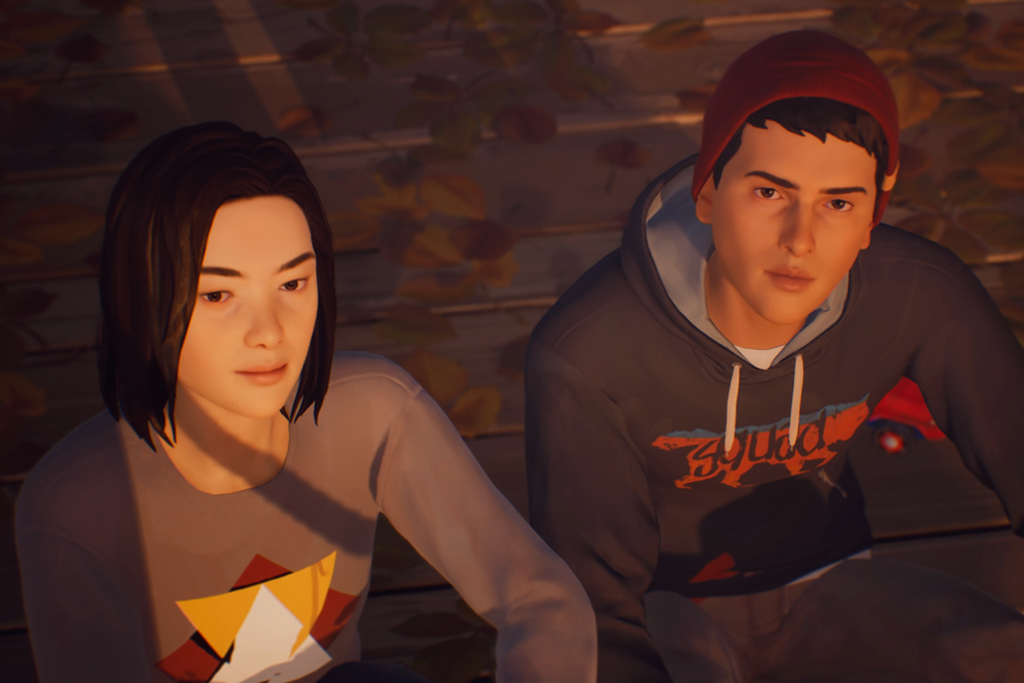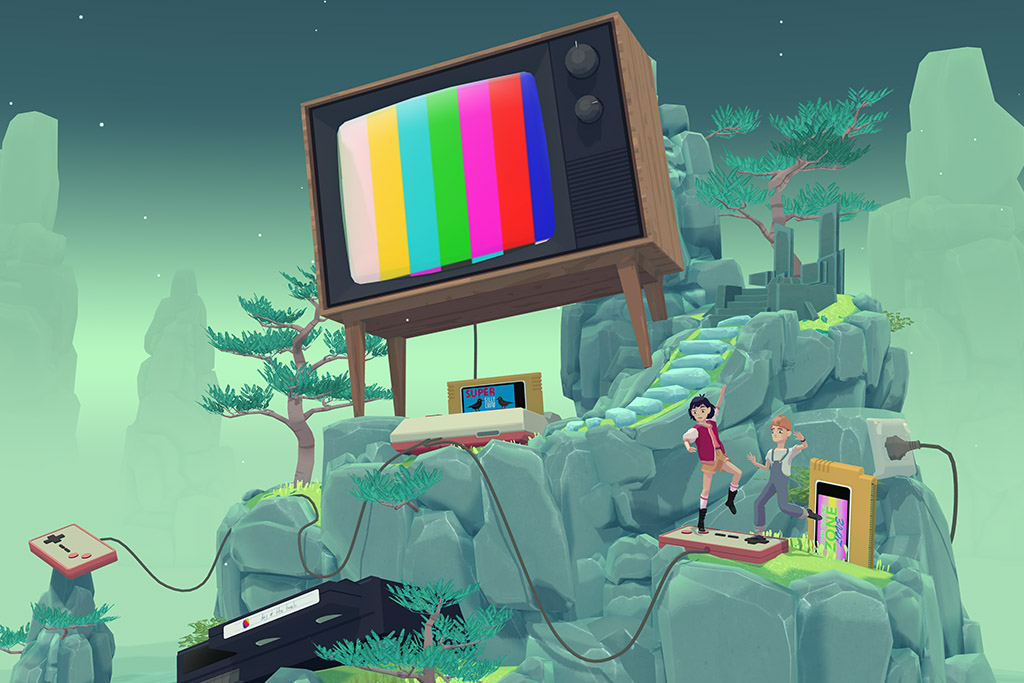Games Are Sometimes Better When They Aren’t All About Saving The World

When game designer Leura Smith tested Pigeon Game on her cousins at a family lunch, their response was, “What the hell, Leu? This game actually looks cool. It doesn’t have, like, pixels and shit.” Leura was surprised because, from a “fun, silly project idea,” she’d created something that was, “OK to enjoy.”
Personal games engage players in unexpected, and often very positive, ways. They’re an invitation to share content that’s meaningful to the designer, and they’re uniquely compelling because you’re bringing your own experiences to the table, too.
One of my earliest memories is of chasing pigeons in Sydney’s Botanic Gardens. I was convinced I would catch one if I could just run a little faster. To me, Pigeon Game is a small child’s power fantasy. Crouch, pat the pigeon, become friends, then hold it and read about the experience in your diary after you’ve let it go. It won’t fly away, when you get close, and that’s really important.
Leura says, “I once had a girl, of about four, play and she was so new to technology that she couldn’t even use a mouse. She ended up playing for thirty minutes (long after she’d met all the different birds). It was touching to watch her interact with my game the way I’d interacted with pet games when I was her age.”
Nintendogs, in which you pat and care for dogs, is one of Leura’s more obvious influences. Using the mouse cursor to touch and hold these pigeons also feels really nice. Why? “The pigeons are made with cloth physics and two spheres to create a jiggle effect,” Leura explains. “I took inspiration from how boobs work in traditional games. Pigeons are goofballs, so using a silly material for their bodies seemed like a good way to go.”
Pigeon Game is intriguing because Leura wasn’t targeting any particular kind of player or making any specific genre of game. She created something that made sense to her and it resonates with people.
I heard Leura speak about Pigeon Game at Freeplay’s Parallels, a popular, annual event which shines a spotlight on independent game developers. Freeplay Director, Chad Toprak, explains, “The original idea was to acknowledge that there’s a world of indie games that exists parallel to AAA. But, almost everyone is now indie, so Parallels highlights intimate, experimental, and culturally significant works.”

Mike Blackney, another Parallels speaker, told a moving story about Dead Static Drive’s unusual combination of driving and horror, and why this game is made by an Aussie, yet set in America. “Expressing this content keeps alive something I started building between me and my late dad. It’s road-travelling Americana, being under the sky and stars, being out on your own. It’s what we shared a love of, and something that we never got to do, together.”
Dead Static Drive’s demo begins in a 1969 Mustang, a ‘sweet ride’. I was looking for food and somewhere to take a leak. After being chased into a gas station by an imposing, electrical insect, I scarfed a cherry pie, drank a beer and gave Thurston a knife. Who’s Thurston? I don’t know. They fell, to unfathomable tendrils emerging from the earth, before I got to know them. I retrieved the knife.
Despite their intimate appeal, personal games needn’t be for everyone.
Next, I stole a cop car, executed perfect donuts on a deserted stretch of road and met my demise, as the insect suddenly pounced and threw the entire vehicle against a mountain. ‘Not like this,’ I screamed (via my character’s comic book speech bubble).
“I don’t think people ever got the feeling that my dad was easy to be around and that they didn’t have to put effort in. So when he liked you, it always felt earned,” Mike says, and that’s how I feel about Dead Static Drive; a deep yearning to be cool enough for it, like when everyone started wearing Levis when I was a teenager and I had no idea how to acquire a pair. Or, perhaps for modern teens, to not be caught enjoying a game with “pixels and shit”.
Dead Static Drive’s art is cool, evocative and transforms as time passes. Shadows grow long, sunset touches features of the environment so that rocks resemble monsters. Mike says, “Run out of gas? There’s an old truck on the side of the road … Dynamic, organic situations feel more frightening to me, so all of these elements are in service of tension, dread, and risk. I want emergent experiences, things getting messy, mistakes being made, losing NPCs, regret at missed opportunities because you weren’t bold enough to take a chance and save someone.”
Dead Static Drive isn’t precisely the half-planned, father/child road trip Mike wanted to take, yet, “Dad would say, ‘Good boy, Mikee,’ and feel good that I was doing something productive, and that made me happy. I’d love to think that he would laugh at the game’s jokes but it feels self-indulgent, a fantasy, to pretend that he’d love Dead Static Drive. Every game I made when I was a kid impressed him but he never really got them. They were gamey, not funny, not for him.”
Would Mike’s dad be impressed by Dead Static Drive? Despite being unreleased, as yet, it has garnered a significant following on social media. It’s just immediately cool. Of course, another Parallels speaker, Ruqiyah Patel, embraces the idea that, despite their intimate appeal, personal games needn’t be for everyone. She says, “If Not Us is a game for readers, not gamers.”

At conventions, Ruqiyah posts a sign that announces, ‘If you like reading and being sad, get this in ya,’ and tells passersby, “You know those fantasy stories where characters go on a big quest to save the world … ?” This combination of information is effective. She says, “Some people walk past or respond with appalled expressions, but I do find the people who want to find my game.”
If Not Us is a disorienting work of interactive fiction, in the fantasy space, where you play as five characters, on separate timelines. Your current timeline is the only one on which you will survive. It’s complicated. I loved discovering a section of the narrative, written in Inform, with the prompt for player-entered commands being, “You OBSERVE. You REMEMBER. You REFLECT. You CHOOSE. Then you will ACT.” Incredibly, at that point in my journey, I knew what to do next.
Ruqiyah says, “People at conventions return multiple times, play with their friends, get different endings, compare their playthroughs, theorise, really try to puzzle it out. Someone is even writing a fanfiction where the characters are all high school students who kiss each other. There’s no romance in If Not Us, and given how obtuse the entire game is, it’s thrilling that someone could have such investment in the characters that they want to make ’em smooch.”
What did Ruqiyah reveal about herself in If Not Us? “The story is me. It’s everything I’ve ever loved in fiction, everything that’s ever triggered an emotional reaction in me, retold in my words and with my style and according to my priorities.” She even finds it hard to say the names of her games. “All of my feelings about the game are condensed into three words. They’re a very weighty set of words.”
It’s a rare privilege to have insight into the why of personal games and to share an experience with game developers. They’re more than games that are “OK to enjoy”, they’re pigeon friends, road trips with a loved one, enigmatically saving the world, and whatever that also means to you.
Meghann O’Neill writes about indie games for PC Powerplay, PC Gamer and her own site www.kidsaregamers.com. If you need something new to play, ask for an indie game recommendation on Twitter @indiegames_muso

